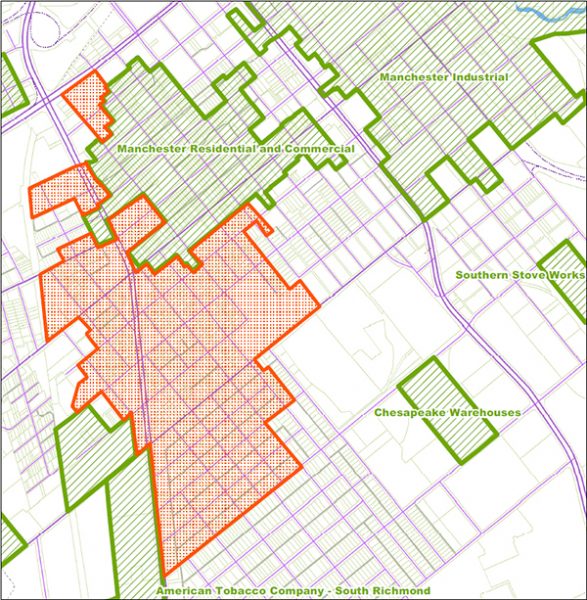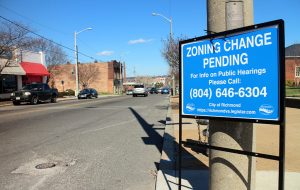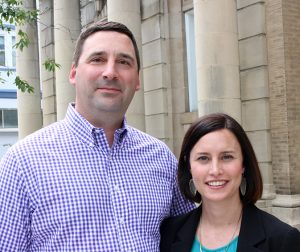
The proposed boundary expansion is shown in orange. Existing historic districts are in green. (City of Richmond)
A delayed vote on a requested boundary expansion of an historic district in Manchester has prompted the local development team behind the proposal to threaten to halt construction and further investment in the area – even though the state agency reviewing the proposal said it supports the plan.
Julie Langan, director of the Virginia Department of Historic Resources, said she is in favor of the proposed broadening of the Manchester Residential and Commercial Historic District requested by Michael Hild, despite the fact that she requested pushing back the vote that had been scheduled for last Thursday.
Langan said she did so in response to concerns shared by members of the public and City Council representatives that residents in affected areas had not been adequately notified or informed of the proposal. While notifications are sent to affected property owners, Langan said, people who rent properties are not required to be notified and cannot submit formal objections.
The expansion would extend the existing 75-acre district – an area generally southeast of Cowardin and Semmes avenues – to properties generally to the south and west, roughly tripling the size of the district to include parts of the nearby Blackwell and Swansboro neighborhoods.
The expansion would add 155 acres spanning about 60 city blocks to the district, allowing many properties in that area to be eligible for state and federal historic preservation tax credits.
Langan said the proposal would help property owners in light of expected development interest.
“I think that having a district designation will help people in Blackwell manage that change,” Langan said. “It gives them more options and it incentivizes the retention of historic buildings as opposed to just taking them down and replacing them with new construction.”
“There’s a real concern about gentrification, not being able to afford to live in that neighborhood, which I completely understand,” Langan said. “I have tried to point out to people when I’ve talked to them that market forces are already changing their neighborhood and their property assessments are already going up, without a district designation.”
Langan pointed to the area’s recent designation as an Opportunity Zone through a federal tax reform bill that was approved last year. The City of Richmond also has responded to development interest in the area through recent zoning changes.
Langan said her department identified Blackwell as eligible for historic designation years ago, but the process requires a request to be made from outside the department – such as the one made by Hild.
“I think that having a district designation will help people in Blackwell manage that change,” Langan said. “It gives them more options and it incentivizes the retention of historic buildings as opposed to just taking them down and replacing them with new construction.”
In response to the vote delay, Hild, whose Church Hill Ventures with wife Laura Dyer Hild has been on a redevelopment streak in Manchester, sent an email to Langan stating they would have no choice but to halt activity in the area, sending “stop work” notices to contractors working on current projects and preventing planned investment that he said was on track to exceed $250 million.
“Unfortunately, neither our bank partners, nor Laura or I can bear the risk of continuing with these projects when we were supposed to have an answer on this important decision this week,” Hild told Langan in the email, referring to tax credits that they’d expected to offset their tax obligations for the current tax year.
As a result, Hild continued, “Many of these projects are now at risk of never proceeding given this decision, and these tax dollars that would have gone into South Richmond redevelopment are likely lost forever.”
Reached last week, Hild said he did not want to discuss the issue further and asked for more time before commenting for a story.
Earlier in the month, Hild had faced heightened scrutiny of the proposal at a series of public meetings for affected and adjacent property owners. Langan said those meetings revealed concerns from the public about whether affected parties had been adequately notified.
She said similar concerns came from two City Council members – Ellen Robertson and Reva Trammell – whose districts are involved in the district expansion. She said both requested that the vote be deferred.
“They really felt blindsided,” Langan said of the council members, adding that additional community meetings were held and will be scheduled through the summer as a result.
While she said she hasn’t received a formal objection letter from any affected property owner, Langan said such concerns prompted her request to delay the vote, which is now scheduled for the boards’ Sept. 20 meeting in Petersburg.
“It is admittedly a very unusual situation, this particular district expansion, because there haven’t been formal objections,” she said. “I have received letters against the district from people who live adjacent to it, and they also receive notification letters that they are adjacent property owners.”
Properties that would be added to the district include the planned Muse Apartments site on Semmes and the United Nations Church property on Cowardin.
Langan said her department knows of nine properties the Hilds own that would be added to the district and therefore eligible for state and federal historic tax credits. Those include the Siegel’s Supermarket site at 2005 Hull St., which they purchased last October for $630,000. The other eight properties are single-family homes.
The Hilds have submitted tax credit applications to the department for those properties and six others that are located within the existing district. Those include the former Meade Memorial Episcopal Church at 1201 Decatur St. and five buildings on Hull Street: 1204-1206, 1209, 1213, 1427 and 1605.
The Hilds are converting 1209 Hull St. into a restaurant and brewery, and 1213 is the site of the planned Hot Diggity Donuts shop, which remained scheduled to open Friday despite the “stop work” orders mentioned in Hild’s email.
Langan said she is not aware of additional planned investment by the Hilds that would account for the $250 million figure mentioned in Michael Hild’s email.
“He has submitted a couple of tax credit applications to this office for review, but by no means in the number that he says he’s acquired properties and intends to use tax credits,” she said. “So he maybe has plans that are bigger than what he’s actually had any part in so far.”
Regarding the timeframe for tax credits Hild mentioned in his email, Langan said last year’s tax reform bill created a rush last December of people trying to acquire property by the end of the calendar year, in an effort to get in under the old rules and avoid the new ones.
“There are deadlines by which you have to have started work (to receive tax credits), and he may be thinking about or referring to that,” Langan said. “But it wasn’t clear to me when I read his email that that’s what was driving his timeframe. It may be.”

Recent zoning changes have increased allowable heights for new buildings along the Old Town Manchester corridor. (Jonathan Spiers)
Other developers active in Manchester said an expanded historic district would be helpful to the area by providing more options to property owners and more protections of existing, historic buildings.
Robin Miller, who has been active for decades in redeveloping parts of Manchester with business partner Dan Gecker, said he supports the expansion but doesn’t expect to acquire more properties there as a result. Charlie Westbrook, who redeveloped three buildings in the 1300 block of Hull Street, said he hasn’t planned additional projects in the area but would be interested in pursuing some if the district is expanded.
Tom Papa of Fountainhead Properties, which has focused many of its projects in the nearby Manchester Industrial Historic District on the other side of Commerce Road, said an expanded historic district would help the area and residents, not hinder them.
“It’s a pretty wonderful way to drive federal dollars into the local economy while we’re getting state support,” Papa said. “Overall, any development in Richmond is just making it more attractive for people to move in and helping the greater good.”
Historic district designations have been increasing in and around Richmond. In Henrico County, a 60-block area of Highland Springs was added earlier this month to the state and national registers of historic places. The recognition gives the Highland Springs Historic District eligibility for state and federal tax credits for qualifying residential and commercial rehabs.

The proposed boundary expansion is shown in orange. Existing historic districts are in green. (City of Richmond)
A delayed vote on a requested boundary expansion of an historic district in Manchester has prompted the local development team behind the proposal to threaten to halt construction and further investment in the area – even though the state agency reviewing the proposal said it supports the plan.
Julie Langan, director of the Virginia Department of Historic Resources, said she is in favor of the proposed broadening of the Manchester Residential and Commercial Historic District requested by Michael Hild, despite the fact that she requested pushing back the vote that had been scheduled for last Thursday.
Langan said she did so in response to concerns shared by members of the public and City Council representatives that residents in affected areas had not been adequately notified or informed of the proposal. While notifications are sent to affected property owners, Langan said, people who rent properties are not required to be notified and cannot submit formal objections.
The expansion would extend the existing 75-acre district – an area generally southeast of Cowardin and Semmes avenues – to properties generally to the south and west, roughly tripling the size of the district to include parts of the nearby Blackwell and Swansboro neighborhoods.
The expansion would add 155 acres spanning about 60 city blocks to the district, allowing many properties in that area to be eligible for state and federal historic preservation tax credits.
Langan said the proposal would help property owners in light of expected development interest.
“I think that having a district designation will help people in Blackwell manage that change,” Langan said. “It gives them more options and it incentivizes the retention of historic buildings as opposed to just taking them down and replacing them with new construction.”
“There’s a real concern about gentrification, not being able to afford to live in that neighborhood, which I completely understand,” Langan said. “I have tried to point out to people when I’ve talked to them that market forces are already changing their neighborhood and their property assessments are already going up, without a district designation.”
Langan pointed to the area’s recent designation as an Opportunity Zone through a federal tax reform bill that was approved last year. The City of Richmond also has responded to development interest in the area through recent zoning changes.
Langan said her department identified Blackwell as eligible for historic designation years ago, but the process requires a request to be made from outside the department – such as the one made by Hild.
“I think that having a district designation will help people in Blackwell manage that change,” Langan said. “It gives them more options and it incentivizes the retention of historic buildings as opposed to just taking them down and replacing them with new construction.”
In response to the vote delay, Hild, whose Church Hill Ventures with wife Laura Dyer Hild has been on a redevelopment streak in Manchester, sent an email to Langan stating they would have no choice but to halt activity in the area, sending “stop work” notices to contractors working on current projects and preventing planned investment that he said was on track to exceed $250 million.
“Unfortunately, neither our bank partners, nor Laura or I can bear the risk of continuing with these projects when we were supposed to have an answer on this important decision this week,” Hild told Langan in the email, referring to tax credits that they’d expected to offset their tax obligations for the current tax year.
As a result, Hild continued, “Many of these projects are now at risk of never proceeding given this decision, and these tax dollars that would have gone into South Richmond redevelopment are likely lost forever.”
Reached last week, Hild said he did not want to discuss the issue further and asked for more time before commenting for a story.
Earlier in the month, Hild had faced heightened scrutiny of the proposal at a series of public meetings for affected and adjacent property owners. Langan said those meetings revealed concerns from the public about whether affected parties had been adequately notified.
She said similar concerns came from two City Council members – Ellen Robertson and Reva Trammell – whose districts are involved in the district expansion. She said both requested that the vote be deferred.
“They really felt blindsided,” Langan said of the council members, adding that additional community meetings were held and will be scheduled through the summer as a result.
While she said she hasn’t received a formal objection letter from any affected property owner, Langan said such concerns prompted her request to delay the vote, which is now scheduled for the boards’ Sept. 20 meeting in Petersburg.
“It is admittedly a very unusual situation, this particular district expansion, because there haven’t been formal objections,” she said. “I have received letters against the district from people who live adjacent to it, and they also receive notification letters that they are adjacent property owners.”
Properties that would be added to the district include the planned Muse Apartments site on Semmes and the United Nations Church property on Cowardin.
Langan said her department knows of nine properties the Hilds own that would be added to the district and therefore eligible for state and federal historic tax credits. Those include the Siegel’s Supermarket site at 2005 Hull St., which they purchased last October for $630,000. The other eight properties are single-family homes.
The Hilds have submitted tax credit applications to the department for those properties and six others that are located within the existing district. Those include the former Meade Memorial Episcopal Church at 1201 Decatur St. and five buildings on Hull Street: 1204-1206, 1209, 1213, 1427 and 1605.
The Hilds are converting 1209 Hull St. into a restaurant and brewery, and 1213 is the site of the planned Hot Diggity Donuts shop, which remained scheduled to open Friday despite the “stop work” orders mentioned in Hild’s email.
Langan said she is not aware of additional planned investment by the Hilds that would account for the $250 million figure mentioned in Michael Hild’s email.
“He has submitted a couple of tax credit applications to this office for review, but by no means in the number that he says he’s acquired properties and intends to use tax credits,” she said. “So he maybe has plans that are bigger than what he’s actually had any part in so far.”
Regarding the timeframe for tax credits Hild mentioned in his email, Langan said last year’s tax reform bill created a rush last December of people trying to acquire property by the end of the calendar year, in an effort to get in under the old rules and avoid the new ones.
“There are deadlines by which you have to have started work (to receive tax credits), and he may be thinking about or referring to that,” Langan said. “But it wasn’t clear to me when I read his email that that’s what was driving his timeframe. It may be.”

Recent zoning changes have increased allowable heights for new buildings along the Old Town Manchester corridor. (Jonathan Spiers)
Other developers active in Manchester said an expanded historic district would be helpful to the area by providing more options to property owners and more protections of existing, historic buildings.
Robin Miller, who has been active for decades in redeveloping parts of Manchester with business partner Dan Gecker, said he supports the expansion but doesn’t expect to acquire more properties there as a result. Charlie Westbrook, who redeveloped three buildings in the 1300 block of Hull Street, said he hasn’t planned additional projects in the area but would be interested in pursuing some if the district is expanded.
Tom Papa of Fountainhead Properties, which has focused many of its projects in the nearby Manchester Industrial Historic District on the other side of Commerce Road, said an expanded historic district would help the area and residents, not hinder them.
“It’s a pretty wonderful way to drive federal dollars into the local economy while we’re getting state support,” Papa said. “Overall, any development in Richmond is just making it more attractive for people to move in and helping the greater good.”
Historic district designations have been increasing in and around Richmond. In Henrico County, a 60-block area of Highland Springs was added earlier this month to the state and national registers of historic places. The recognition gives the Highland Springs Historic District eligibility for state and federal tax credits for qualifying residential and commercial rehabs.



